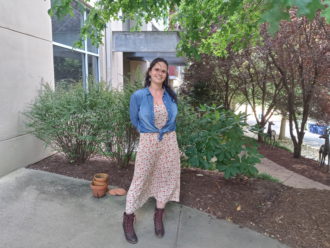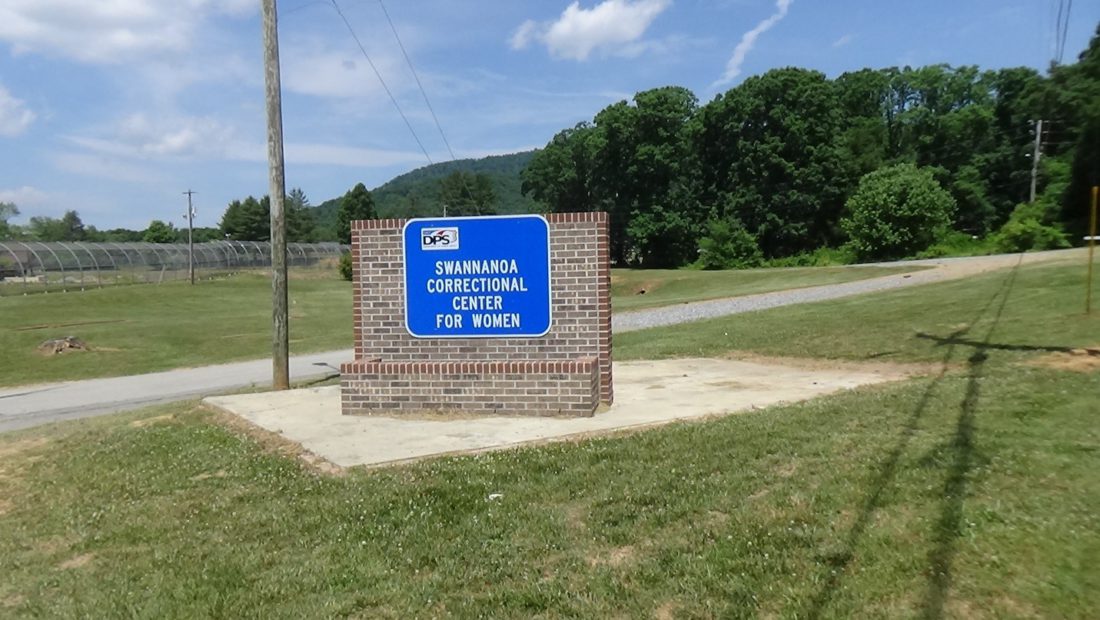The sight of a couch almost brought Sybriea Lundy to tears.
It was a little thing, she says. But the homey piece of furniture she saw on her transfer to the Western Correctional Center for Women (formerly the Swannanoa Correction Center for Women), Lundy continues, marked a night-and-day difference from her experience over nearly five years spent at the N.C. Correctional Institution for Women in Raleigh, which she said had been a “very bleak” time.
“I kept waiting for the guards to be mean to me, but they look you in the eye and have a kind and encouraging word, and that was very different from what I experienced previously,” she says of WCCW. “The entire vibe was different. They actually wanted to help you. The prevailing feeling was that they cared and wanted you to be successful.”
She’d finally become eligible to transfer to WCCW in 2015, with hopes to transition back into society through the prison’s mentorship and work-release programs. After her conviction for drug trafficking in 2010, she says, she wanted to turn her life around. Lundy was released in 2016 and credits the Vera Pathways from Prison to Postsecondary Education program she participated in while at the prison for helping her build a better life since. She now works as a lending services associate at the Asheville-based nonprofit Mountain BizWorks.
Her experience has led Lundy to think about recidivism and the reasons other people continue to commit crimes after leaving prison. A primary cause, she believes, is that inmates often lack access to rehabilitation programs like the ones she experienced while incarcerated at WCCW.
“You’re locked away in this place for so long and you don’t do anything for yourself,” she says of other prisons. “You don’t wash your own clothes; you don’t cook your own food. You have no say over anything you do. Then they just throw you back out into the world and expect you to be able to swim.”

But now, Lundy is concerned that other women may not get the same opportunities she received. A staffing shortage across North Carolina’s prisons led to the temporary closing of a wing at WCCW in late August and the relocation of several dozen prisoners and staff. While the wing has since been reopened and staff returned to work, it’s unclear if or when the inmates who were transferred out will return.
Down in the count
As a result of the WCCW wing closure, 25 staff members were transferred to Craggy Correctional Institution, a minimum- and medium-security unit for men located in Woodfin, according to a press release from the N.C. Department of Public Safety. Sixty-four inmates from the closed unit were transferred to other women’s prisons.
“We have consolidated operations and staffing at 30 prisons in the state as a result of chronic staffing shortages at all 55 of our facilities,” said Todd Ishee, the state’s commissioner of prisons, in the press release.
The relocations, according to Ishee, were designed to improve ratios of guards to inmates elsewhere to boost prison safety. He noted that the state prison staff vacancy rate was 23.5% as of August; the functional vacancy rate, including filled positions in which an employee is not working due to illness, COVID-19 exposure, family emergency or other issue, sat at 33.64%. Ishee said the staffing issues “predate the pandemic, but COVID-19 hasn’t helped matters.”
Brad Deen, a DPS spokesperson, said in an email to Xpress that work and basic educational programs are available in all 55 state prisons. He acknowledged that vocational and postsecondary offerings vary depending on each facility and its local partnerships but said that inmates transferred from WCCW would have access to “comparable” programs elsewhere. He added that no WCCW inmates on work-release or in academic classes were transferred, nor were kitchen workers and grounds/cleaning crews.
“It is unfortunate that some former Swannanoa offenders are temporarily unable to complete courses,” he said, adding that those in the Human Resources Development curriculum at A-B Tech were between courses when the temporary shutdown started. He said two transferees have since been returned to WCCW to continue their courses at the college; other courses have been suspended in response to the pandemic or other reasons.
DPS has been holding hiring events across the state that have touted on-the-spot job offers for those who pass a background check. Meanwhile, a forthcoming state budget could include up to $1,000 in COVID-19 bonus pay for workers in adult correction and juvenile justice and make a path for employees to move up in the ranks.
Progress paused
As of Sept. 17, Cari Barcas, a board member with the nonprofit Ministry of Hope, reported that prison staff had been returned to WCCW and that the facility was again accepting new inmates, with 13 women transferred from Anson Correctional Center on Sept. 20. The nonprofit works with WCCW to offer religious, educational, vocational and transitional services, as well as domestic violence and grief counseling, to help women reenter society after their prison terms are done.
But Barcas said it remains to be seen whether the women transferred out will return. And according to Lauronda Morrow, Ministry of Hope’s board chair, the closing of the WCCW wing could set back the prisoners’ progress. Some were sent to medium-security facilities with stricter rules, she says, while inmates and staff participating in a drug treatment program were dispersed across the prison system.
A WCCW employee, who insisted on anonymity because she wasn’t authorized to speak to the press, says the prison’s more relaxed atmosphere compared to the Raleigh facility is key to rehabilitation. Going back to Raleigh was the main concern of several of the transferred inmates, she says.
“There’s talk that they can access transitional services there, too, but it’s comparing apples and oranges,” the employee says. “At Swannanoa, [the inmates] can prepare mentally and emotionally, and learn to be a good neighbor. That’s what happens at Swannanoa.
“They’re in prison for something they did, but they are survivors of trauma in one way or another,” she continues. “We had one woman who was a survivor of domestic violence. She got triggered when she was screamed at. And when you go to Raleigh, you get screamed at, and it’s a downward spiral from there.”




Before you comment
The comments section is here to provide a platform for civil dialogue on the issues we face together as a local community. Xpress is committed to offering this platform for all voices, but when the tone of the discussion gets nasty or strays off topic, we believe many people choose not to participate. Xpress editors are determined to moderate comments to ensure a constructive interchange is maintained. All comments judged not to be in keeping with the spirit of civil discourse will be removed and repeat violators will be banned. See here for our terms of service. Thank you for being part of this effort to promote respectful discussion.